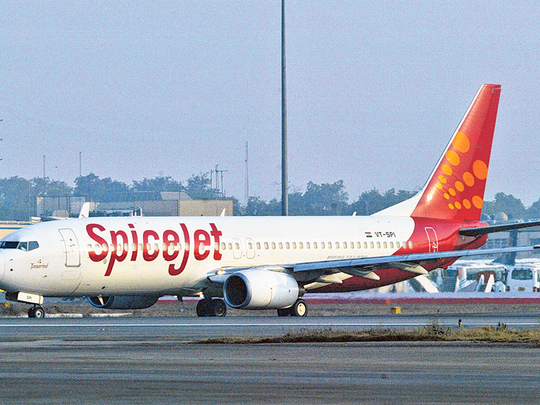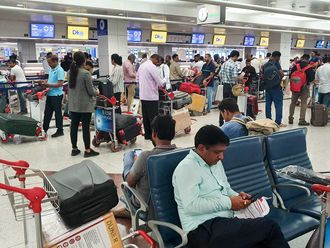
New Delhi: Two years ago, Indians watched with dismay as Kingfisher Airlines, the popular carrier founded by liquor tycoon Vijay Mallya, cut its flight schedule, lost its credit lines from airports and fuel companies, then collapsed under a mountain of debt.
Today, Indian travellers, bankers and policymakers are alarmed that SpiceJet, the country’s second-largest airline by domestic passenger share, appears on a similar course.
After cutting its daily flights from 332 to 230 in the past two months to cope with a severe liquidity crunch, SpiceJet is struggling to secure new capital to stay aloft.
Kapil Kaul, South Asia chief executive for the Centre for Asia Pacific Aviation, estimates that the once-profitable carrier needs $300m-$350m for a revival, after reporting five consecutive quarters of losses.
After seeking a new strategic partner for the past two years, Kalanithi Maran, the Chennai-based media magnate who took a controlling stake in the airline in 2010, is under pressure to provide a cash lifeline.
But Maran, whose brother was telecom minister in the previous Congress-led government, has other problems. The Maran brothers are facing criminal charges in connection with a controversial 2006 telecom deal, and are facing the potential seizure of some of their assets. The family denies any wrongdoing.
“Without significant and immediate promoter funding, I see no future,” Kaul said in a note. “I expect things to deteriorate further, and see a massive rush for refund claims.”
Indians are already bracing for an imminent shutdown. On Monday, Indian media reported that SpiceJet had warned its pilots of a possible disruption to services, amid concerns that Prime Minister Narendra Modi’s government was poised to end the airline’s credit lines from state-owned airports and fuel suppliers.
While New Delhi has apparently decided to keep the credit taps open in view of the upcoming peak holiday season, analysts say the government’s handling of SpiceJet’s troubles has exacerbated the carrier’s woes.
Ashok Gajapathi Raju, aviation minister, complained this month that SpiceJet’s troubles were “giving us a heart attack”. Days later, the government banned SpiceJet from taking bookings for more than 30 days in advance, triggering a wave of cancellations from existing ticket-holders and cutting off its only potential source of revenues.
New Delhi also cancelled the airline’s valuable arrival and departure slots, making the carrier less attractive to potential investors. “The minister hasn’t helped matters much by making comments that hurt confidence,” says Neelam Mathews, a New Delhi-based aviation analyst and contributing editor to Aviation International News.
Kaul also criticised the government, saying it had undermined a fragile carrier at a critical juncture. Though aviation authorities must remain vigilant on safety issues, he said in a note last week, “the government shouldn’t be seen as aiding an airline closure”.
But analysts say that the Maran family must also shoulder blame for costly decisions, including the acquisition of new Bombadier Q-400 aircraft to connect smaller locations, rather than relying on a single aircraft type, like most budget carriers.
The airline’s recent spate of “flash sales”, offering tickets at bargain prices to raise working capital, has also been criticised by industry analysts.
The crisis at SpiceJet comes as India’s domestic airlines — all but one of which have been losing money for years — are looking to benefit from low global oil prices and an expected economic rebound.
Overseas interest in India’s aviation potential is also increasing, as foreign carriers make long-term bets on an underdeveloped market, following the opening of the Indian skies to foreign airline investment.
Last year Etihad purchased a 24 per cent stake in Jet Airways, India’s oldest surviving private airline that has not reported an annual profit since 2007, and is helping Jet to turn round its business.
Both Singapore Airlines and low-cost carrier AirAsia have tied up with India’s Tata Group to set up new domestic airlines.
AirAsia India started flights earlier this year from Bangalore to several small city destinations. The Singapore Airlines-Tata venture received its air operator permit on Monday and its new full-service carrier, called Vistara, is due to take-off soon.
But analysts say SpiceJet’s troubles and the losses of other Indian carriers are a warning to investors of the tough times ahead, especially if oil prices rebound.
India has the highest jet fuel taxes in the world, and some of the world’s most price-sensitive passengers — a combination underpinning the aviation industry’s $10bn in accumulated losses over the past seven years.
Only India’s largest airline, IndiGo, which started flying in 2006 and now has 32 per cent per cent share of the domestic market, has eked out profits.
“If you have seven airlines and six are making losses quarter after quarter, the government is partly to blame,” says Amber Dubey, a partner at KPMG. “It can’t just be that all the airlines are full of incompetents. There is a systemic problem, and a systemic problem can only be resolved by the government.”
— Financial Times










